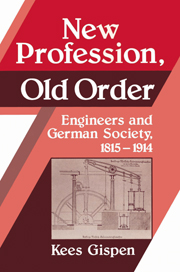Book contents
- Frontmatter
- Contents
- List of tables
- List of figures
- Preface
- Abbreviations
- Introduction
- Part I Emulation: Bildung and the bureaucratic order
- 1 Technical education and society before 1850
- 2 Nationalism, industrialization, and technology: the first years of the Verein Deutscher Ingenieure
- 3 The pursuit of Bildung: Grashof and the VDI, 1856–1876
- 4 The reform of technical education in Prussia, 1876–1879
- Part II Reorientation: industrial capitalism and a “practical” profession
- Part III The crucible: technical careers and managerial power, 1900–1914
- Epilogue
- Appendix
- Bibliographical note
- Index
2 - Nationalism, industrialization, and technology: the first years of the Verein Deutscher Ingenieure
Published online by Cambridge University Press: 11 September 2009
- Frontmatter
- Contents
- List of tables
- List of figures
- Preface
- Abbreviations
- Introduction
- Part I Emulation: Bildung and the bureaucratic order
- 1 Technical education and society before 1850
- 2 Nationalism, industrialization, and technology: the first years of the Verein Deutscher Ingenieure
- 3 The pursuit of Bildung: Grashof and the VDI, 1856–1876
- 4 The reform of technical education in Prussia, 1876–1879
- Part II Reorientation: industrial capitalism and a “practical” profession
- Part III The crucible: technical careers and managerial power, 1900–1914
- Epilogue
- Appendix
- Bibliographical note
- Index
Summary
Prior to the mid–1860s, the deep cleavage between engineers that would result from state educational policies remained dormant. The manifest result of introducing industrial education was to stimulate technological development by producing a class of men who possessed considerably more technical know-how than had earlier generations of artisans and manufacturers. In the context of preunification Germany this had a group-formative effect, rather than a fragmenting effect.
BACKGROUND
Commenting on the peculiarities of his country's technological culture, an observer of the industrial scene noted in 1879 that “basically we had technical schools in Germany before there was a truly developed industry, while in other countries the reverse was the case” Though an exaggeration, that observation came close to the mark. Starting industrialization with schools meant that the critical personnel of German industry from the outset had close ties to the technical institutes. Government efforts in the field of technical education gave rise to industrial technicians, entrepreneurs, and managers who had been exposed to some theoretical training in schools, or at least had colleagues who answered to this description.
Taken together, these men represented a preliminary synthesis of theory and practice. They ranged between the traditional social types of apprenticeship-trained tradesmen and the educated classes. Regardless of whether they were entrepreneurs, employees, self-employed consultants, or teachers, these early engineers no longer fit the old dualistic social typology. They constituted a hybrid and a new social phenomenon.
- Type
- Chapter
- Information
- New Profession, Old OrderEngineers and German Society, 1815–1914, pp. 44 - 63Publisher: Cambridge University PressPrint publication year: 1990

